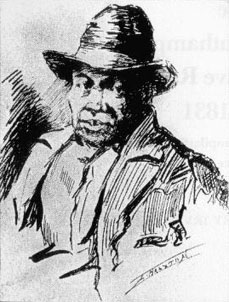Note: This piece was written in 2005 for a Creative Writing Class at the College of Alameda with Wendy Williams. In honor of his birthday, September 15, here is "Conversation with Claude."

Last Thursday, I had the extreme pleasure of meeting
Claude McKay. McKay was a poet, novelist, and journalist during the Harlem Renaissance, and many saw him as the inspirational force behind the movement.
While attending the weekly open mic series, “Holla Back,” at the Eastside Arts Alliance in Oakland on 25th and International, I bumped into McKay. I didn’t recognize him at first, and then when he identified himself, I thought he was supposed to be dead.
Apparently, he was not and had performed a few poems earlier that evening.
The first poem McKay performed was, “Africa.” The poem was a sonnet uplifting the image of Africa. The delivery was real smooth and it just brought you into his poetry. The crowd seemed to be pleased, but I don’t think they knew who he was.
The second poem performed by McKay that evening was, “The Lynching.” This poem describes a lynching and the communal and celebratory treatment these activities became. The poem describes the sinful practice of lynching, and the joy or “fiendish glee” many attending felt.
The final poem McKay performed is my favorite poem. The poem is entitled, “If we Must Die.” The poem is a call for people to defend themselves, their honor and their respect. The delivery was very powerful, but I’m sure it was the words being spoken, and the not the manner in which they were spoken, which made the poem so.
After McKay finished, the next artist went up to perform and I went outside to talk with McKay while he smoked a cigarette. McKay had never been to California before, although he had extensively traveled outside the US during his lifetime.
McKay told me he was born on September 15th, 1890 in Sunny Ville, Clarendon Parish in Jamaica. His parents, Thomas Francis McKay and Hannah Ann Elizabeth Edwards were farmers. As the youngest of eleven children, McKay was sent to live with his oldest brother, who was a school teacher, which enabled him to get the best education possible.
McKay recalled writing his first poem at about ten years old, although he remembers being poetically inclined well before that time. At about 16 years of age, McKay went to trade school to apprentice as a carriage and cabinet maker. Soon after, McKay briefly tried to be a police officer with the constabulary. These occupations didn’t work out for McKay as he was not following his passion; writing.
The next year, McKay encountered a man who would soon become his mentor, a English man by the name of Walter Jekyll, who encouraged McKay to write his poems in Jamaican dialect verse. Over the course of those next five years, McKay had published two volumes of dialect verse, Songs of Jamaica (1912) and Constab Ballads (1912).
Upon immigrating to the United States, McKay enrolled at Tuskegee Institute in Alabama. Based on what he had learned of Booker T. Washington, McKay headed there to study agronomy and first encountered American racism. After a brief period at Kansas State College in Kansas, McKay moved to New York. In 1914, the contribution from Jekyll which brought him to New York enabled McKay to open a restaurant and marry Eulalie Imelda Lewars. After a year, both ventures dissolved as Lewars went back to Jamaica to give birth to their child.
McKay had to take some odd jobs for a while before finally publishing, “Invocation”, and “The Harlem Dancer,” in 1917. Through these poems, McKay received recognition as a poet and was consequently published in Pearson’s magazine, and The Liberator, a socialist journal. Through this recognition of his lyrical skill, McKay’s early career got a great jump start. After becoming a socialist, McKay became the editor of, The Liberator, and wrote articles for various other publications, especially left-wing.
During the summer of 1919, also known as the Red Summer, there was a period of increased violence against Blacks. It was during this time McKay created, “If we Must Die,” “Baptism,” “The White House,” and “The Lynching.” McKay felt it was necessary to speak out about the attacks and many feel these poems were his best protest material.
During World War II, Winston Churchill even quoted, “If we Must Die,” while encouraging their troops to fight steadfast in the face of danger. McKay felt it was necessary to speak directly about racial and social issues and focused his material on the working class.
Later that year, McKay told me he moved to England for two years. While there, he worked at the British socialist journal, Worker’s Drednought and published, “Spring in New Hampshire.” Upon returning to the United States, McKay published, Harlem Shadows, before returning abroad.
Over the next twelve years, McKay spent time in various foreign countries in Europe, the Soviet Union, and Africa. McKay felt this period was one of the most difficult in his life, as he witness, and experienced, extreme poverty and illness.
While in France, McKay published, “Banjo: A Story without a Plot,” in 1929, which told the

BANJO by Claude McKay. Published in 1929 |
story about an African-American musician, in France, and his experiences. While the story did not sell very well, it did influence the emergence of the Negritude literary movement of French West Africa and the French West Indies. While in Morocco, McKay published
Banana Bottom, a novel many feel was McKay’s greatest. McKay tells me the novel was about Jamaican Bita Plant, who was educated in England, and returns to Jamaica only to struggle with identity issues.
McKay was financially forced to return to the US in 1934. McKay later completed his autobiography, “A Long way From Home,” which was published in 1937. Still a socialist, McKay continued publishing essays and articles in various publications. In 1940, McKay wrote, “Harlem: Negro Metropolis,” an unpopular, but important historical nonfiction piece. McKay felt his inability to regain the acclaim of the 1920s was due to his race and not obtaining academic credentials.
McKay felt some of his unhappiness was due to him not returning to his homeland, which he left in 1912, but he soon became a US citizen in 1940. After moving to Chicago in 1944, McKay became a Catholic, after claiming agnosticism his whole life. While he shocked many close friends, it helped him with a spiritual fulfillment he had been seeking. McKay told me that a few years before he passed that he was physically declining due to heart disease and high blood pressure. While in Chicago, McKay worded for the Catholic Youth Organization until his death from congestive heart failure in 1948.
This was shocking news due to the fact that McKay was physically standing before me. McKay told me that it was not him whom I bear witness to, but a manifestation of his poetry, as he was in his 1920s physical form. McKay told me he was present as there has been a reemergence of interest in his poetry. As McKay stated in his autobiography, “I have nothing to give but my singing. All my life I have been a troubadour wanderer, nourishing myself mainly on the poetry of existence. And all I offer here is the distilled poetry of my experience.”
McKay then told me not to forget him or his message, and ran across the street to get on AC Transit bus #82. I went back inside to listen to the other poets.
As I watched Ghetto Prophet onstage performing, “Wake Up,” I thought about my conversation with McKay, until I felt a strange shaking on my shoulder.
Michael Walker said, “Reggie Wake Up, man, ‘Holla Back’ is over.
Read more...


 Hope cannot be lost, only misplaced.
Hope cannot be lost, only misplaced. 

 Last Thursday, I had the extreme pleasure of meeting
Last Thursday, I had the extreme pleasure of meeting 
 I have dreams of meeting folks like
I have dreams of meeting folks like  I recently found an old USB drive while cleaning. It had just 512MB, but whoa! It had some content.
I recently found an old USB drive while cleaning. It had just 512MB, but whoa! It had some content. 




